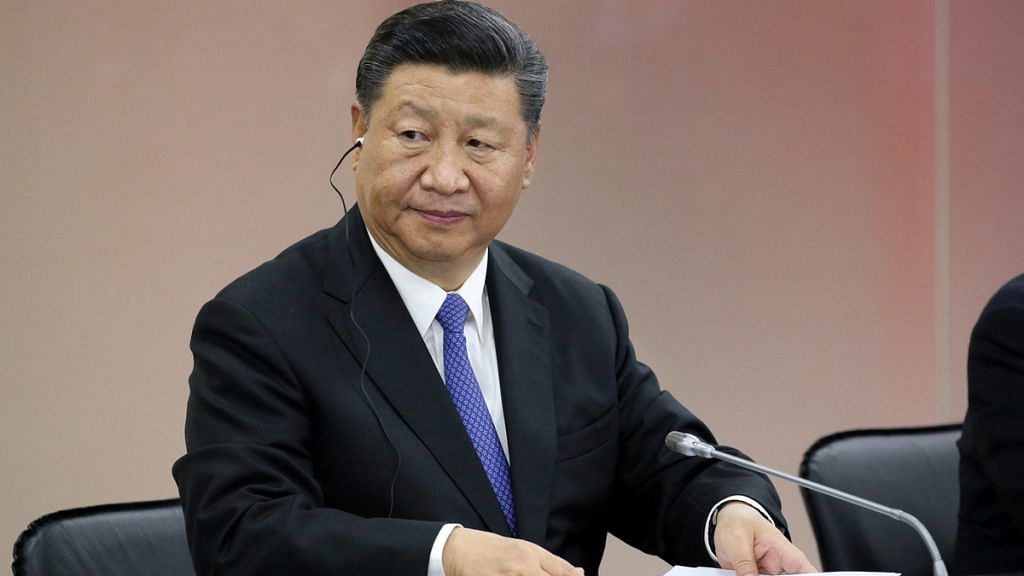On the same day it emerged that China’s authorities had detained as many as 1.5 million Muslims in Xinjiang — from doctors and professors to football players — for “re-education”, most of whom had committed no crime and were held with neither evidence nor due process, Beijing deemed on account of its “responsible attitude” towards evidence and process that a self-avowed jihadist militant like Jaish-e-Mohammed chief Masood Azhar could not be designated a global terrorist.
It has been 10 years since the case of the chief of the Jaish-e-Mohammed — itself a UN-proscribed organisation that has publicly claimed a role in several attacks, most recently in Pulwama — first came before the UN Security Council 1267 Sanctions Committee.
There have been four attempts since then to list him. On every instance, his lone defender was China.
The most recent application, for which India had, to its credit, secured the support of three of the permanent members of the UNSC — the US, UK and France — as co-sponsors, is not yet entirely killed.
Also read: Masood Azhar at UN: Failed Indian diplomatic offensive or China’s Pakistan support too deep?
The technical hold placed by Beijing on 13 March delayed the application by six months, allowing the sponsors to furnish more evidence. If still unsatisfied, this can be delayed by another three months, following which it will either pass or be blocked, as was the case with the applications in 2009, 2016 and 2017.
India and China are likely to have held their second ‘informal summit’ by the time the hold lapses this September. The latest hold has, for many observers in India, questioned whether the much-trumpeted ‘Wuhan spirit’ of the first Narendra Modi-Xi Jinping informal summit has, one year on, truly yielded dividends – whether on terrorism or even on easier-to-bridge issues such as trade, where Chinese pledges to open market access haven’t appeared to materialise.
India’s desire to push for its rapprochement with China in 2018 also appeared to relegate issues such as the Azhar listing and the Nuclear Suppliers’ Group membership — where Beijing was again the lone obstacle — to the back-burner from the central space they occupied in 2016 and 2017, with no move to again push the Azhar issue at the UNSC the following year. While perhaps an argument could be made that the India-China relationship is larger than individual issues, this was a significant shift that Delhi, to this day, hasn’t really explained.
Make no mistake, continued Chinese opposition on the Azhar issue — we have no reason to believe that Beijing will support the application in six months’ time or refrain from vetoing it at the end of the year — will remain a serious obstacle in relations, and also ultimately adversely impact other avenues of engagement, not to mention public opinion in India.
Beijing recognises this. And the perplexing question is why Beijing seeks to expend political capital — and erode the recent warming of ties with India — on a character as unsavoury as Masood Azhar. The issue of evidence clearly holds little water, considering the same body deemed it sufficient to proscribe Azhar’s organisation, the JeM.
Also read: India and Pakistan silent on China’s horrific Muslim ‘re-education’ camps
What appears to be driving Beijing’s calculus is its rather large bet on its ‘all-weather ally’ — and more specifically, its reliance on its friends in Pakistan’s military-intelligence apparatus to keep in check those groups that China deems a threat, such as Uighur separatists.
Beijing’s bet on “good terrorists” and “bad terrorists” might serve its goals in the short-term, as it looks to take forward its massive investments — and secure the safety of tens of thousands of Chinese workers — under the China Pakistan Economic Corridor (CPEC). Road corridors of the CPEC, incidentally, pass through the very same district as Balakot, the site of a prominent JeM training camp that India’s airstrikes targeted.
But in the long-term, this is a risky bet that will more likely fail than succeed. Just ask Amrullah Saleh, the former head of Afghanistan’s national security directorate, who told me a few years ago in Beijing that he had supplied his Chinese hosts with dossiers showing how the Pakistani deep state, while professing to crack down on some Uighur groups with its left hand, was quietly supporting others with its right, seeing them as useful assets.
Also read: China’s refusal to list Masood Azhar as a terrorist holds some lessons for Modi govt
He said he warned his hosts in Beijing that tolerating one part of the Pakistani terror eco-system — instead of eradicating it — and distinguishing between good and bad terrorists is a strategy that is doomed to fail, as his own country’s experience showed, and that in the long run, its risky bet on its ‘all-weather’ partner wouldn’t pay off.
That, however, is not how Beijing sees it, and as its close strategic ties with Pakistan develop even closer economic bonds, the stakes have only grown higher.
The author is a Visiting Fellow at Brookings India and was formerly China correspondent for India Today and The Hindu.
